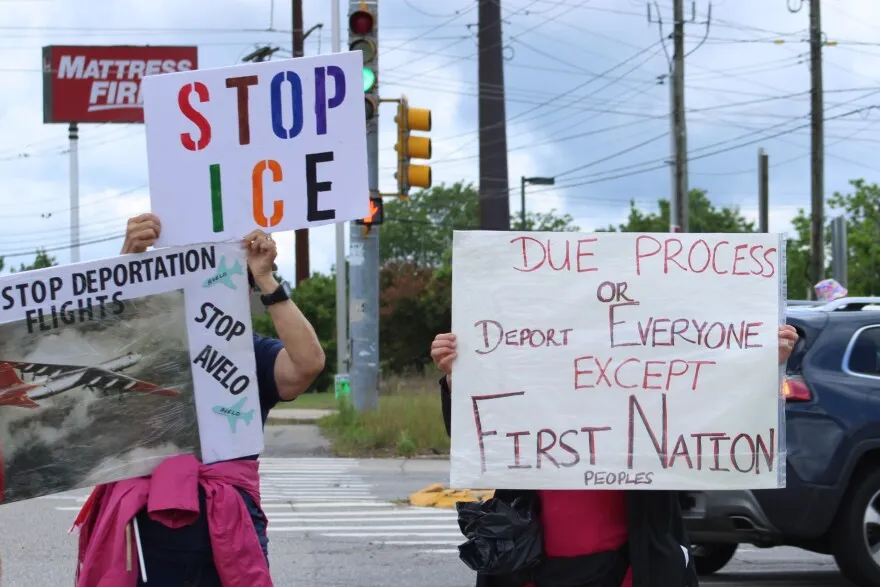Avelo Airlines Faces Backlash as Activists Demand Changes
Avelo Airlines, a low-cost carrier that has made a mark in regional travel, finds itself amid growing controversy and significant public outcry over its role in deportation flights operated for U.S. Immigration and Customs Enforcement (ICE). Activists, community members, and various organizations are banding together to challenge the airline’s involvement in these operations, leading to a series of protests at several airports, including Tweed New Haven Airport in Connecticut and Romulus, Michigan.
The Spark of Protests
Recent reports have detailed the airline’s participation in deportation flights, which has fueled outrage from immigrant rights activists and community organizations who view these actions as a betrayal to the communities that Avelo serves. Tensions escalated as protests erupted at various airports where Avelo operates, where demonstrators called for a boycott of the airline.
Protesters Gather at Tweed New Haven Airport
On a crisp afternoon, demonstrators gathered at Tweed New Haven Airport, holding banners and chanting slogans denouncing the airline’s cooperation with ICE. Community member Maria Gonzales, who spoke at the rally, expressed her dismay, saying, ‘Avelo claims to be our friend, connecting us with affordable travel options, but by supporting deportations, they are directly harming individuals and families in our communities.’
The protesters included people from various backgrounds—immigrants, activists, students, and local citizens—all dedicated to advocating for the rights of those at risk of deportation. Many participants shared personal stories of family members and friends affected by ICE’s aggressive deportation policies, highlighting the human impact of these flights.
Community Responses and Boycott Calls
As news regarding Avelo’s participation in deportation flights spread, local and national organizations began to publicly condemn the airline’s actions. Prominent organizations such as the American Civil Liberties Union (ACLU) and United We Dream launched campaigns urging the public to boycott Avelo Airlines. In their statements, advocates asserted that the airline’s involvement in these activities prioritizes profit over human lives.
Calls for the boycott are resonating strongly within immigrant communities, who are demanding that Avelo rethink its operational partnerships with the government. Advocates have argued that supporting these deportation flights not only undermines the airline’s professed values of accessible, affordable travel but also damages its reputation among the growing population of socially conscious travelers.
Additional Protests in Romulus, Michigan
Meanwhile, in Romulus, Michigan, another demonstration unfolded as protesters convened outside of Detroit Metro Airport, which is also linked with Avelo’s operations. The atmosphere was charged, with passionate speeches delivered by local leaders framing the issue as more than just about the airline—asserting that it represents a larger systemic issue affecting immigrant rights in the U.S.
A local activist, who identified as Hassan Rahman, stated, ‘We cannot stand by while airlines like Avelo contribute to the destruction of families and communities. We are demanding accountability and a change in policy from their leadership.’ Activists highlighted this fight as part of a broader civil rights movement dedicated to protecting vulnerable populations.
The Impact of Deportation Flights
Deportation flights have long been an area of contention in the U.S., as critics argue that the government’s actions often disproportionately impact low-income and marginalized communities. According to a report by the Migration Policy Institute, the U.S. has dramatically increased the number of deportations in recent years, further complicating the lives of individuals who have built their lives in the U.S.
Advocates believe that airlines like Avelo bear a degree of responsibility for complicit behavior in facilitating these deportations. Critics have raised questions about the ethical implications of such partnerships, asserting that public transportation should not be implicated in governmental policies that disrupt and destroy families.
Avelo Airlines Responds
In response to the protests and public outcry, Avelo Airlines issued a statement attempting to clarify its position. The company reiterated its commitment to providing affordable travel options while also emphasizing compliance with all federal laws. ‘We are a private airline that operates within the confines of the law,’ the statement read. However, this response has done little to quell the waves of discontent among activists and community members.
Future Implications for Avelo
As Avelo Airlines navigates this controversy, the long-term implications of these protests could shape the future of the airline’s operations and its public image. The growing demand for ethical business practices, coupled with an increasingly aware and activist-oriented public, presents a shifting landscape for airlines and other companies involved with ICE.
The widespread use of social media to organize and amplify protest efforts has also galvanized supporters nationally. Videos, photographs, and compelling narratives shared online have drawn attention beyond local communities, leading to greater awareness and support for immigrant rights across the country.
The Broader Context of Deportation Practices
This situation is part of a larger debate surrounding immigration policies and practices in the United States. The involvement of corporations in governmental deportation and detention operations raises serious ethical concerns, and Avelo is not the sole airline under scrutiny. Other carriers have similarly faced backlash and protests over their cooperation with ICE.
As debates continue in Congress about reforming immigration law, many call for systemic changes that uphold human dignity and justice. Activists are increasingly vocal about the need for corporations to prioritize social responsibility, engaging in partnerships that promote human rights rather than contributing to practices that exacerbate societal inequalities.
Conclusion: A Movement for Change
The ongoing protests against Avelo Airlines signify more than just a reaction to the airline’s activities; it represents a growing movement for justice and protection of immigrant rights across the country. As communities come together to challenge the corporate complicity in government-sanctioned deportations, they are igniting a conversation about the responsibilities of businesses in society. As Avelo responds to these challenges, the outcome will reveal whether they choose to uphold their commitment to community values or remain entrenched in controversial practices that undermine their customers’ trust and well-being.







